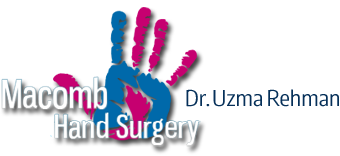How to Treat (and Prevent) Common Golf Injuries
Any serious golfer will tell you that the arms take a beating on the golf course. A golf injury can take on many forms, but a whopping 64% will affect the wrist, hand, elbow, or shoulder. Often, the pain from a golf injury can leave you with more questions than answers. In this article, Detroit area wrist, arm and hand specialist Dr. Uzma Rehman will help you answer some of those questions by breaking down some common golf injuries, and how to treat them.
Golf Injuries to the Wrist, Arm & Hand
Golf Hand Injuries
Hand pain is often the result of an improper grip. This type of golf injury can be easily prevented. Avoid gripping the club too tightly or in the wrong manner.
A common golf injury that can cause hand pain is a wrist bone fracture. The hook of the hamate is a wrist bone which can sometimes fracture or even break if the club strikes the ground, a rock, or some other hard object.
Lastly, there’s carpal tunnel syndrome. Carpal tunnel is not reserved for those who spend a lot of time behind a desk, but rather the condition can have many root causes. People who golf often have been known to develop the condition.
Golf Wrist Injuries
Hitting what is known as a “fat shot” (an unexpected divot) can put significant strain on the wrists. This is a leading cause of sprains. Sprained wrists are among the most common golf injuries, and are often the result of poor mechanics.
Wrist tendinitis is another common golf injury. This is often the result stress placed on the wrist while swinging the club. Small tears can occur in the wrist tendons which will slowly become inflamed. The onset of wrist pain from this condition can happen gradually or even after golfing. Additionally, this type of pain can become chronic.
Golf Elbow Injuries
Forearm and elbow pain can be the product of a golf injury that is so common, it was named after the sport itself. Golfer’s Elbow. Usually, golfers develop this condition because of the strain that comes with repetitive motion.
Strained or torn ligaments are also common. Resulting from continuously swinging the club poorly, this type of golf injury will cause very sharp pain in the elbow, usually after the club has made contact. Golfers experiencing this are advised to consult with a doctor.
Golf Shoulder Injuries
Shoulder tendinitis. Tendinitis and golf swings go hand-in-hand. As with tendinitis in the wrist, the pain from this injury can happen gradually and it can be chronic. Sometimes called “shoulder impingement”, shoulder tendinitis occurs when tendons become pinched between shoulder bones. If the tendon tears, surgery will be needed.
Golf Injury Treatments
Far too many golf injuries are the product of overuse. No matter how tempting it may be to simply play through the pain will only make the problem worse. Ignoring an injury is a good way to ensure that a golfer will ultimately spend even less time on the course.
When experiencing pain, first take these steps: Rest. Ice. Anti-inflammatory medication. Let’s say that again. Rest. Ice. Anti-inflammatory medication.
Taken in this order, these steps should provide relief. However, if the pain continues or worsens, you should schedule a consultation with a hand, wrist, elbow & shoulder specialist.
Always call a hand, wrist, elbow & shoulder specialist if you experience:
- Numbness and/or tingling
- Sudden, very sharp pain when your club makes contact with the ground
- Intense pain when moving
- Pain continuing for more that 2-3 days
Treating Golf Injuries with Occupational Therapy
Depending on the type of golf injury, a doctor may recommend physical therapy. Occupational therapy is frequently used in the treatment of Golfer’s Elbow. A therapist will employ various stretching and exercise to help decrease pain and increase recovery time.
Golf Injuries Requiring Surgery
In the rare case where a golf injury requires surgery, it’s usually because of a torn ligament—elbow ligaments are among the most commonly torn.
If you suspect a tear may be causing your pain, a clinical evaluation is in order. Detroit area wrist, arm and hand specialist Dr. Uzma Rehman is a board certified hand surgeon who has been in practice for more than 18 years. Dr. Uzma will evaluate your condition and determine if surgery is necessary.
Avoiding Golf Injury
Start by warming up! Stretch your legs, elbows, wrists, arms and hands before playing.
Use quality equipment that is suitable for your physical needs. Avoid clubs that are too long or too short.
Take a few lessons! Poor swings are often the culprit of golf injury. Professional lessons can be an invaluable investment for those who plan to hit the links often.
Golf Injury | Hand, Arm & Wrist Specialist | Detroit Area
The best way to treat a golf injury is to prevent a golf injury. But if an injury is keeping you off the course in the Detroit area, schedule a consultation with Dr. Uzma Rehman at Macomb Hand Surgery today. Doctor Rehman will assess your individual situation and prescribe the treatments that are best for your condition.

